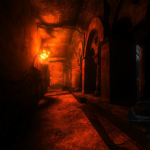by Fr. Patrick Henry Reardon
 From the beginning, the proclamation of the Gospel has always involved a claim that the full weight of universal human wisdom declares to be impossible: the resurrection of a man who had been dead in his grave for a couple of days—as distinct from the resuscitation of someone apparently dead
From the beginning, the proclamation of the Gospel has always involved a claim that the full weight of universal human wisdom declares to be impossible: the resurrection of a man who had been dead in his grave for a couple of days—as distinct from the resuscitation of someone apparently dead
This claim, without which there is no Gospel, is the primary component of the “folly” mentioned by the Apostle Paul as inevitably characteristic of the Christian message. That is to say, those who proclaim the Gospel declare to have happened a thing everybody knows cannot happen.
For this reason, those who believe the Gospel inevitably find themselves separated from what the rest of the human race considers normal and sane. They willingly place themselves outside of every premise and expectation common to the race of men. From the minute they accept the Gospel thesis, they implicitly declare that they no longer care a fig about what the rest of the world thinks; they are prepared to be regarded as fools on the earth. Believers go for broke. They have burned their bridges with respect to this world. All their eggs are in the Easter basket.
On the other hand, this detachment from the expectations of the world is the source of an immense practical freedom for the Christian people. Liberated from mankind’s most fundamental premise and most tenacious preconception—namely, the impossibility that the dead should rise—Christians start from scratch with respect to human opinion on any matter whatever. If they refuse to concede to human wisdom at least that primary premise, there is never again a compelling reason to concede any point to human wisdom.
The first preachers of the Gospel were completely aware of this fact, being quite familiar with the world’s ingrained prejudice about the finality of death. They faced the problem squarely, armed only with the convictions of conscience.
They were especially careful not to let the Resurrection of Christ become some sort of “spiritual” experience. Had they spoken of the risen Christ as a kind of incorporeal vision or phantom, someone spiritually who “lived on” after death, their message would surely have met acceptance from many of their contemporaries. Christians did not succumb to that temptation, however. They insisted that Jesus rose in his very body, the body numerically identical to the one in which he died on the cross.
The Gospel accounts—in the measure they reflect Christian apologetics—are emphatic on this point. The risen Jesus commands his friends:
“Behold my hands and my feet, that it is I myself. Handle me and see, for a spirit does not have flesh and bones as you see I have” (Luke 24:38).
The post-Resurrection accounts depict Jesus as being touched (John 20:27), embraced (Matthew 28:9), and clung to (John 20:17).
These experiences were physical. The Apostle Peter later described them to the friends of Cornelius:
“God raised him up on the third day, and showed him openly, not to all the people, but to witnesses chosen before by God—to us who ate and drank with him after he arose from the dead” (Acts 10:41).
One of those meals was a hot breakfast, which the risen Jesus prepared for his friends (John 21:9). There was nothing incorporeal or visionary about that breakfast picnic on the beach.
At the same time, those who preached the Resurrection of Christ did not think he had simply been restored to what he was before. He was not a resuscitated corpse. They knew him to be alive in an entirely new way—alive beyond the reach of death. He was risen, said the Apostle Paul,
“in power” (Romans 1:4).
To those who believed in the Gospel, the physical body of Jesus, risen from the grave, was proof that death had been definitively conquered:
“Christ, having been raised from the dead, dies no more. Death no longer has dominion over Him. In that he died, he died to sin once for all; but in that he lives, he lives to God” (Romans 6:9-10).
Even though Jesus’ risen body was physical, therefore, those who bore witness to it also mentioned that it had been set free from the usual physical limitations. Just as it was free from the domination of death, so it was liberated from ordinary physical restrictions, such as those imposed, for example, by closed doors. That is to say, rising from the dead, Jesus showed himself completely free from every human expectation—not only death, but even the laws of physics.
